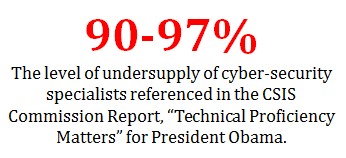One of the questions I have had a bit following on from my analysis of the Australian penetration testing market, is the implied size of the global penetration testing market. Or at least, the size of the US penetration testing market, on the assumption that it is going to be the largest. With a few minutes to spare, I thought I would try to kludge together a number that at least seems plausible given the (admittedly very few) external reference points available.
IBIS World released a research report in August 2012 (the "IT Security Consulting in the US Market Research Report") which provides a couple of free snippets of data - a revenue figure of $5 Billion, and, interestingly, the statement that "there are no companies with a dominant market share in this industry" - which is exactly the conclusion I came to when looking at the Australian penetration testing market.
So there's our first data point: The US IT Security Consulting Market (2012) is estimated at $5 Billion.
Global Industry Analysts, Inc have estimated the 2013 global information security products & services market at $104 Billion, and RNCOS has estimated the global IT security market at $96 Billion (both figures from this interesting analysis of the Turkish IT security market). Not wildly dissimilar numbers which is always a nice start. A PricewaterhouseCoopers report in 2011 apparently put the estimated market size at $60 Billion, so a bit smaller, but with forecast growth, probably closer to a $75 Billion estimate by 2013. Gartner has put the global market at $55 Billion in 2011 with a forecast growth path that would imply something like $67 Billion for 2013.
The US is estimated to make up close to half of all cyber-security spending globally. Which seems quite plausible when one considers the size of both defence-led Government cyber-security expenditure, and also the size of the economy. That would put the US cyber-security market into the vicinity of $35-45 Billion for 2013.
One potentially useful stat we can gather from the above, is that IT security consulting, is ~10-15% of the overall IT security market size.
So how do Australia's numbers compare?
This fairly old data set from 2009 has Gartner estimating the Australian IT security market size being about $250 Million. Let's add on 20%-year-on-year growth since then, and we're at $500 Million-ish today. Given my previous analysis of the Australian penetration testing market put it at $200-300 Million on its own, I think this is a pretty low estimate. A 2008 estimate by IDC forecast the market would hit $1.5 Billion by 2011, which actually sounds a bit more workable.
If this is correct, and if my previous penetration testing market estimates are plausible, then at a macro level, organisations are spending 10-20% of their security budget on penetration testing and vulnerability assessment. This feels a bit high (probably reflecting the fact that less is being spent than the bottom-up estimate of penetration testing expenditure would suggest), and also seems not to match with the US estimate of 10-15% of IT security spend going to consulting. Given this would contain a great deal of 'non-penetration testing' consulting services, for penetration testing alone, let's go with something closer to 5% to be a bit more conservative.
So as rubbery as these data sets may be, they would suggest that the US penetration testing market is in the $1.5 - 3 Billion range... Which makes it 8-10 times the size of the Australian market, which given the size of the US economy (GDP $15.094 Trillion) is a larger order of magnitude than that, larger than the Australian economy (GDP $1.37 Trillion), would seem to make sense.
And just to recap my favourite point once again... "there are no companies with a dominant market share in the [IT security consulting] industry". As I said at the end of the Australian analysis, this is a great market to be a part of; and on a global scale that is no different.





